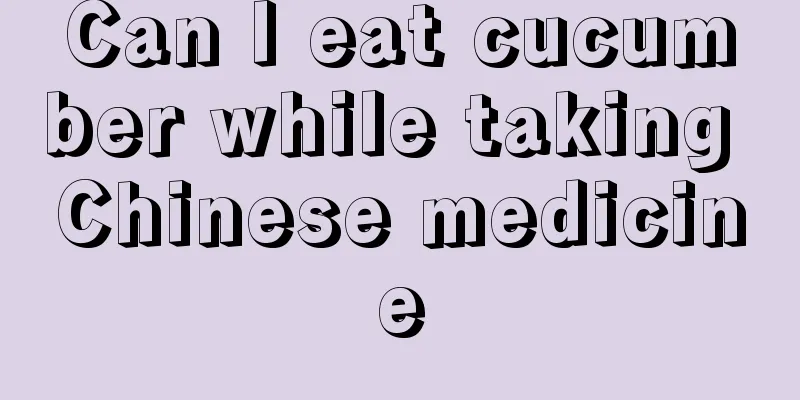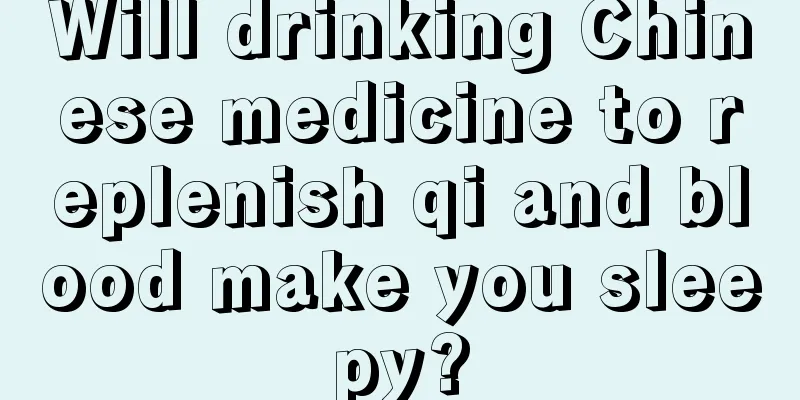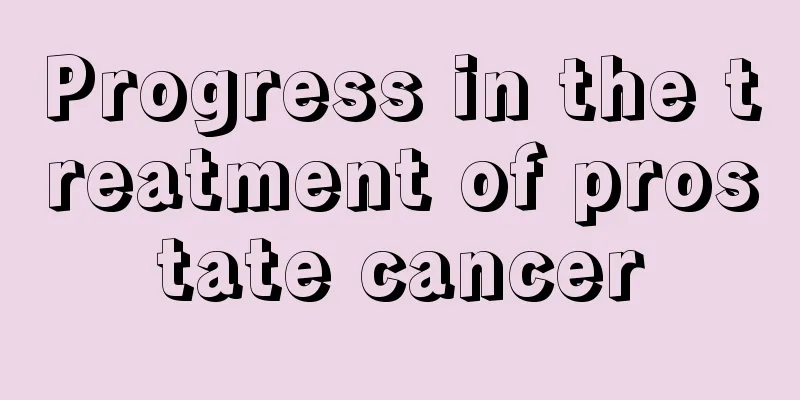Can I eat cucumber while taking Chinese medicine

|
Cucumbers contain a lot of anthocyanins, so cucumbers can play a very obvious beauty-enhancing effect on women. Therefore, female friends not only like to eat cucumbers, but also like to use cucumbers to make cucumber masks. In the process of taking Chinese medicine, everyone also needs to pay attention to many issues, because if these issues are not paid attention to, the Chinese medicine will easily lose its efficacy. So can I continue to eat cucumbers while taking Chinese medicine? Yes, the relevant population and the general population can eat it. 1. It is suitable for patients with fever, obesity, hypertension, hyperlipidemia, edema, cancer, and alcoholics; and it is one of the first choice foods for diabetics. 2. However, people with weak spleen and stomach, abdominal pain and diarrhea, and cold lung and cough should eat less cucumber, because cucumber is cold in nature, and patients with cold stomach may easily suffer from abdominal pain and diarrhea after eating it. Preparation Instructions 1. Eat cucumber raw as fruit, but not too much. 2. Cucumbers contain fewer vitamins, so if you eat cucumbers regularly, you should eat other fruits and vegetables at the same time. 3. The tail of the cucumber contains more bitter substances, which have anti-cancer effects, so don’t throw away all the tails of the cucumber. 4. People with liver disease, cardiovascular disease, gastrointestinal disease and high blood pressure should not eat pickled cucumbers. Dietary therapeutic effects: Cucumber is sweet, cool, bitter, non-toxic, and enters the spleen, stomach, and large intestine meridians; it has the effects of removing heat, promoting diuresis, detoxifying, clearing heat and promoting diuresis; it is mainly used to treat thirst, sore throat, conjunctivitis, and burns. Taboos of taking Chinese medicine 1. Avoid eating raw or cold food While taking Chinese medicine, you should try to avoid eating all kinds of raw and cold foods. Traditional Chinese medicine points out that raw and cold foods are mostly cold in nature and very difficult to digest after consumption. Moreover, raw and cold foods can irritate the stomach and intestines after consumption. In this case, if you take Chinese medicine immediately, it will seriously irritate the gastrointestinal tract, thereby affecting the gastrointestinal absorption of the drug. Therefore, special attention should be paid to avoid eating raw and cold foods when taking Chinese medicine to treat "cold symptoms", such as medicines for warming the meridians and unblocking the collaterals, and medicines for dispelling cold and dampness. 2. Avoid radish Experts remind that whether you are taking Chinese or Western medicine, you should try to avoid eating radishes while taking the medicine, otherwise the medicinal properties will be greatly affected. The reason why many people’s condition does not improve after taking a large amount of medication is largely related to improper diet. Especially when taking Chinese medicine, you should not eat radish, except for some medicines for regulating qi and resolving phlegm. The reason why you cannot eat radish during this period is because radish has the effects of digesting food and breaking up gas, especially when taking tonic Chinese medicine such as ginseng and astragalus. 3. Avoid spicy food People who are taking traditional Chinese medicine also need to avoid various spicy foods. Otherwise, not only will it weaken the medicinal properties, it may even react with the medicine and seriously endanger human health. Traditional Chinese medicine points out that hot and spicy foods are mostly warm in nature, consume qi and stir up fire, so you should try to avoid these foods when taking Chinese medicines for clearing heat and eliminating toxins, nourishing yin and increasing fluids, cooling blood and nourishing yin, or you should also try to avoid eating spicy foods during the treatment of carbuncles and ulcers. 4. Avoid greasy food All kinds of greasy foods should also be avoided while taking Chinese medicine. Traditional Chinese medicine points out that greasy foods are sticky, and can also promote dampness and phlegm, and cause loose bowels and stagnant gas. After consumption, it will mix with the medicine and hinder the gastrointestinal absorption of the active ingredients of the medicine, thereby reducing the efficacy. Especially patients with weak spleen and stomach, indigestion, hypertension, coronary heart disease and other diseases should eat less of this kind of food in their daily life. 5. Avoid foods that cause irritation This type of food is all wind-inducing, phlegm-generating and fire-stimulating. Since the degree to which the disease selects for food varies, the effects of this disease will also be different. Such foods include mushrooms, champignons, bamboo shoots, mustard greens, pumpkin, rooster meat, pork head, sow meat, etc. For example, patients with hyperactivity of liver yang and internal liver wind should not eat rooster meat and pork head meat; patients with skin diseases such as furuncles, boils, sores and carbuncles should not eat shiitake mushrooms, bamboo shoots, rooster meat, pork head meat and sow meat, otherwise it will accelerate redness, swelling and pus formation; people with gastrointestinal diseases should not eat pumpkin, because pumpkin contains sugar, eating too much will produce more acid, which will irritate the gastrointestinal tract. In view of this, "fa" can be said to, to a large extent, to promote the deterioration of the disease. 6. Avoid fishy and smelly food Generally, Chinese medicines have aromatic smells, especially aromatic dehumidifying and aromatic qi-regulating medicines, which contain a large amount of volatile oils to exert their therapeutic effects. These aromatic substances are most incompatible with fishy smells. If you do not avoid fishy smell when taking Chinese medicine, it will often affect the efficacy of the medicine. Such as the fishy smell of fish, shrimp, and seafood, and the mutton smell of cattle and mutton. Patients with allergic dermatitis such as allergic asthma, allergic rhinitis, boils, eczema, urticaria, etc. must avoid eating fishy and smelly foods while taking Chinese medicine. 7. Avoid strong tea Generally, do not drink strong tea when taking Chinese medicine, because tea contains tannic acid. Strong tea contains more tannic acid. When taken with Chinese medicine, it will affect the body's absorption of the active ingredients in the medicine and reduce its efficacy. Especially when taking "ejiao" and "tremella", avoid taking them with tea. Taking them at the same time will cause the tannic acid, bioalkali, etc. in the tea to precipitate, affecting the body's absorption. If you have the habit of drinking tea, you can drink a little green tea, and it is best to drink it 2 to 3 hours after taking the medicine. |
<<: Will Chinese medicine go bad if not kept in the refrigerator?
>>: Chinese herbal formula for treating fungi
Recommend
What are the sex life skills for adults
With the development of society, people's con...
Nasopharyngeal angiofibroma is common in
Nasopharyngeal angiofibroma is common in adolesce...
Incubation period of mild sugarcane poisoning
Sugarcane is a very sweet plant. Many people who ...
Does it hurt to remove the stitches after double eyelid surgery?
As we all know, during double eyelid surgery, loc...
What are the late stage symptoms of nasopharyngeal carcinoma and how to treat it
What are the late symptoms of nasopharyngeal carc...
What medicine is effective for weight loss
Some weight loss pills currently on the market co...
What goes well with yogurt
A cup of yogurt every day not only helps replenis...
What medicine can be taken to treat night sweats caused by kidney yin deficiency
People with night sweats due to kidney yin defici...
How to cut nails correctly_
Some people will find bacterial infections or eve...
What are the precautions for massage chairs?
With the development of people's economy, mas...
How to treat viral warts on the feet?
Viral warts are a relatively common skin disease....
Differential diagnosis of colon cancer
The differential diagnosis of colon cancer is mai...
Pathological classification of prostate cancer
Prostate cancer mainly occurs in men over 50 year...
Can nasopharyngeal cancer cause ear congestion?
Can nasopharyngeal cancer cause ear congestion? 1...
How long will it take for melanoma to die if you don't take medicine
If a disease like melanoma appears in our lives, ...









